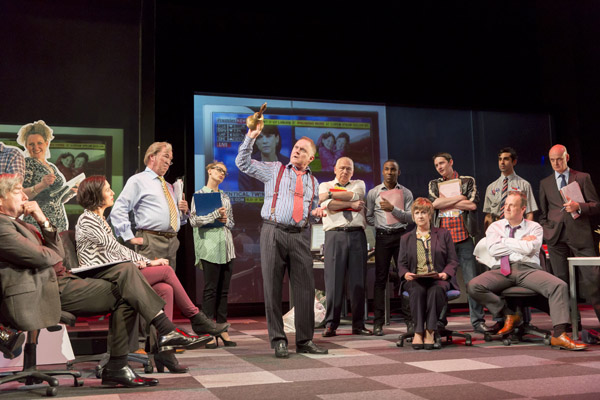Great Britain, National Theatre | reviews, news & interviews
Great Britain, National Theatre
Great Britain, National Theatre
Richard Bean’s timely play about phone hacking and corrupt tabloids is fun but too long

The National Theatre delayed the opening of this play about newspapers for two weeks as it waited for the results of the phone-hacking trial. Is this what a tabloid would call “legal health and safety gone mad” – or what a broadsheet would characterise as “a sensible precaution”? Either way, in the wake of last week’s verdict on former News of the Screws editor Andy Coulson, who was found guilty of phone hacking, Richard Bean’s new play is certainly timely.
Piper plays Paige Britain (geddit?), the young and ambitious news editor of The Free Press, a redtop not completely dissimilar to The Sun. Her editor is Wilson Tikkel (quite unlike Kelvin MacKenzie) and her proprietor is Paschal O’Leary (not a bit like Rupert Murdoch). As you can tell from the silly names, this epic satire is as lurid in its cartoonish detail as the lurid and cartoonish British popular press. It's a tabloid play about a tabloid scandal.
It’s clever, it’s slick, and it’s often really very funnyUnder the slogan of “We go out there and destroy other people’s lives – on your behalf”, The Free Press evolves from feeding the public’s relentless appetite for celebrity gossip into something much more sinister. Paige learns how to hack phones, and then a sensational murder case helps her sell more copies and brings her into contact with some pretty important policemen. When O’Leary appoints his red-haired darling Virginia White (no resemblance to Rebekah Brooks) to the editorship of the paper the plot jumps up a gear.
Bean has taken the phone-hacking scandal, added some instances of MPs’ expenses, changed all the names to protect the guilty and then written the whole affair as a cross between The Beggar’s Opera and a stand-up routine. It’s clever, it’s slick, and it’s often very funny. In Asian Met Commissioner Sully Kassam Bean creates one of his typically hilarious and eccentric characters, who lights up the stage whenever he opens his mouth (usually to put his foot in it). It’s vivid, comic writing from the man who brought us the wonderful One Man, Two Guvnors.
In Piper’s hands, the amoral Paige is also an appealing character. She’s gutsy, she’s spiky, she’s sexy and she’s good fun. She also has no conscience and doesn’t care what she does – as long as it sells copies. Rarely has a villain been so attractive. Yet, after almost three hours of stage action, I have to admit that a certain tedium sets in. Tabloid humour, filthy language and sexual innuendo are best taken in small doses and this epic story sprawls at inordinate length. It badly needs an editor. There's a crudity about the satire that gets mighty tiresome and jovial vulgarity can be boring after a while.
 When, after ages and ages, Paige finally comes onto the stage to accuse the audience of complicity and complacency, no one seems to care. And this seems to be the general effect of the show: only the tasteless jokes about disability get a sharp intake of breath. Otherwise, we are all swept away by the one-liners, the video projections and the humorous headlines. But the effect is wearying in the end. What’s lacking is any sense of real surprise; there’s too much finger-wagging – funny how populist satire can’t quite shake off the dead hand of Teacher.
When, after ages and ages, Paige finally comes onto the stage to accuse the audience of complicity and complacency, no one seems to care. And this seems to be the general effect of the show: only the tasteless jokes about disability get a sharp intake of breath. Otherwise, we are all swept away by the one-liners, the video projections and the humorous headlines. But the effect is wearying in the end. What’s lacking is any sense of real surprise; there’s too much finger-wagging – funny how populist satire can’t quite shake off the dead hand of Teacher.
Still, while not exactly challenging, there is plenty to enjoy in Nicholas Hytner’s vigorous and often charming production, which opens without the usual previews. The cast is large and hardworking (pictured above), with Piper confidently leading the audience through the story, and Robert Glenister (Tikkel), Aaron Neil (Kassam) and Dermot Crowley (O’Leary) all enjoyable to watch. The best bits – the Queen playing drums for the Hitler Youth and the laser-sharp jokes about Rebekah Brooks – are great, but I long to see an abbreviated version.
rating
Share this article
Add comment
The future of Arts Journalism
You can stop theartsdesk.com closing!
We urgently need financing to survive. Our fundraising drive has thus far raised £49,000 but we need to reach £100,000 or we will be forced to close. Please contribute here: https://gofund.me/c3f6033d
And if you can forward this information to anyone who might assist, we’d be grateful.

Subscribe to theartsdesk.com
Thank you for continuing to read our work on theartsdesk.com. For unlimited access to every article in its entirety, including our archive of more than 15,000 pieces, we're asking for £5 per month or £40 per year. We feel it's a very good deal, and hope you do too.
To take a subscription now simply click here.
And if you're looking for that extra gift for a friend or family member, why not treat them to a theartsdesk.com gift subscription?
more Theatre
 Troilus and Cressida, Globe Theatre review - a 'problem play' with added problems
Raucous and carnivalesque, but also ugly and incomprehensible
Troilus and Cressida, Globe Theatre review - a 'problem play' with added problems
Raucous and carnivalesque, but also ugly and incomprehensible
 Clarkston, Trafalgar Theatre review - two lads on a road to nowhere
Netflix star, Joe Locke, is the selling point of a production that needs one
Clarkston, Trafalgar Theatre review - two lads on a road to nowhere
Netflix star, Joe Locke, is the selling point of a production that needs one
 Ghost Stories, Peacock Theatre review - spirited staging but short on scares
Impressive spectacle saves an ageing show in an unsuitable venue
Ghost Stories, Peacock Theatre review - spirited staging but short on scares
Impressive spectacle saves an ageing show in an unsuitable venue
 Hamlet, National Theatre review - turning tragedy to comedy is no joke
Hiran Abeyeskera’s childlike prince falls flat in a mixed production
Hamlet, National Theatre review - turning tragedy to comedy is no joke
Hiran Abeyeskera’s childlike prince falls flat in a mixed production
 Rohtko, Barbican review - postmodern meditation on fake and authentic art is less than the sum of its parts
Łukasz Twarkowski's production dazzles without illuminating
Rohtko, Barbican review - postmodern meditation on fake and authentic art is less than the sum of its parts
Łukasz Twarkowski's production dazzles without illuminating
 Lee, Park Theatre review - Lee Krasner looks back on her life as an artist
Informative and interesting, the play's format limits its potential
Lee, Park Theatre review - Lee Krasner looks back on her life as an artist
Informative and interesting, the play's format limits its potential
 Measure for Measure, RSC, Stratford review - 'problem play' has no problem with relevance
Shakespeare, in this adaptation, is at his most perceptive
Measure for Measure, RSC, Stratford review - 'problem play' has no problem with relevance
Shakespeare, in this adaptation, is at his most perceptive
 The Importance of Being Earnest, Noël Coward Theatre review - dazzling and delightful queer fest
West End transfer of National Theatre hit stars Stephen Fry and Olly Alexander
The Importance of Being Earnest, Noël Coward Theatre review - dazzling and delightful queer fest
West End transfer of National Theatre hit stars Stephen Fry and Olly Alexander
 Get Down Tonight, Charing Cross Theatre review - glitz and hits from the 70s
If you love the songs of KC and the Sunshine Band, Please Do Go!
Get Down Tonight, Charing Cross Theatre review - glitz and hits from the 70s
If you love the songs of KC and the Sunshine Band, Please Do Go!
 Punch, Apollo Theatre review - powerful play about the strength of redemption
James Graham's play transfixes the audience at every stage
Punch, Apollo Theatre review - powerful play about the strength of redemption
James Graham's play transfixes the audience at every stage
 The Billionaire Inside Your Head, Hampstead Theatre review - a map of a man with OCD
Will Lord's promising debut burdens a fine cast with too much dialogue
The Billionaire Inside Your Head, Hampstead Theatre review - a map of a man with OCD
Will Lord's promising debut burdens a fine cast with too much dialogue

Comments
Went last night. Two seats
I have to agree with